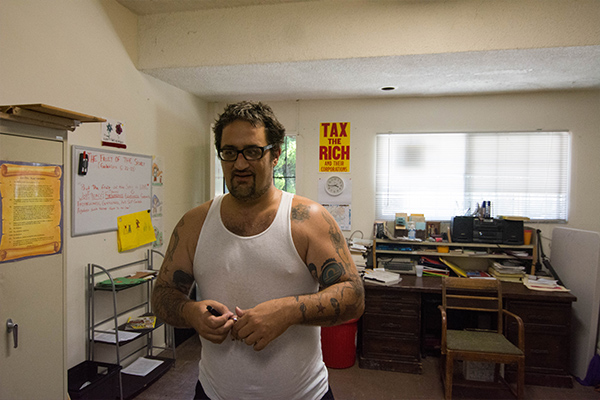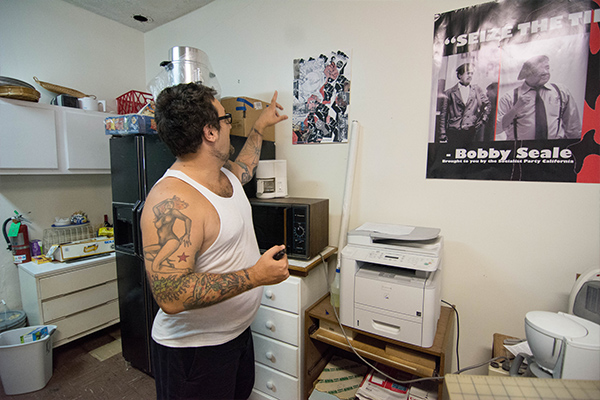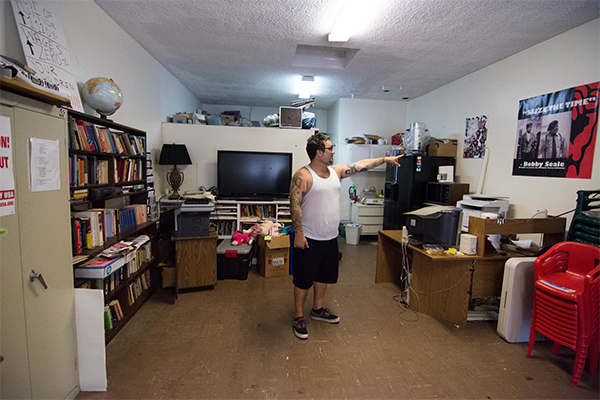Male Co-Chair Of Socialist Party USA Discusses Socialism In The U.S.

You’re the male co-chair of Socialist Party USA. That could get you shot in some parts of this country. What’s it like to be one of the leaders of a frequently demonized faction?
It’s not that bad actually. Sometimes I take for granted how easy it is in here L.A. We have members throughout the country and I know what they face on a daily basis, declaring themselves as open socialists. It’s got a bit of a taboo in some places. But here, nobody really bats an eye.
Generally, in the media at least, socialism is portrayed as this big evil institution out to get us all. Do you see that reflected in the people you interact with?
A lot of that comes from misconceptions about what it means. Really it’s just a lack of understanding about what the term means. But there’s definitely curiosity about it. Whether that’s positive or skeptical depends on who you’re talking to or where you are. I think people are generally surprised when they take that step forward and openly declare themselves a socialist, how minimal the negative response can be.
So if it’s a minimal response, could the case be made that socialism might be making a surge in the U.S.?
Conditions have become so progressively bad for folks, students, working people, etc. I think people are starting to realize that capitalism isn’t going to work for them. With the advent of social media and the Internet, people can do their own fact checking. They can hear something about socialism and look it up and question ‘is this true?’, ‘is someone bullshitting me?’ It becomes more challenging to spin tales about the evils of socialism now people can fact-check how evil something actually is. That’s been very helpful to us. Maybe 30 years ago it would have been more difficult for us, but now I can just say look at the facts.
Facts have a well-known liberal bias--
Exactly! People respond to the facts. When we go out to educate everyone starts saying ‘I didn’t know that!’ or ‘Why don’t more people know about this?’ They realize there’s a lot of important information that just isn’t getting through.

I think corporate media and capitalist institutions suppress a lot of the information that’s available. It’s not information they’re going to publicize. There’s a sort of vested interest that the information and facts get buried into irrelevance. The information and statistics aren’t very convenient for them. But it’s great for us.
People need to find out what’s actually going on, and ultimately it just comes from good journalists. Glenn Greenwald, Jeremy Scahill and a bunch of others are doing a good job, and I hope that we see more.
Plus people reporting on the ground now with smartphones, whether it’s in Ferguson, on Occupy, or in Gaza. I read that Israel was having a real challenge of shaping the media portrayal of what was going on there because people can report so quickly on what’s actually going on there, and determine whether or not it jives with the official record. That’s fantastic; we have access to truth. And I think that in the long run, coming from a socialist perspective, this is good news.
There was, for a great while actually, in the 20th century a truly global movement towards socialist governments. Do you see that ever happening again as we move forward into the 21st?
I think there has been continued representation throughout, and as people start feeling the capitalist boot on their necks suffocating them people will continue to see the light. And whether it’s in Latin America or Asia or Europe, I think we’ll continue to see more and more and more of this.
Like in Seattle? A public acknowledgment and support of far-left principals?
Seattle’s election of Kshama Sawant was a great step. In 2012 we had a young man in New Jersey who ran as an open socialist against a Republican for the school board. He won. So there’s been this history in the U.S. where socialist have support in some places—Milwaukee had a socialist mayor for a number of years. And I’d expect that after the victory in Seattle we’ll just start seeing more people elected into office. And I know a handful of campaigns that are running right now, so we’ll see.
I think we’re moving in a positive direction. Does this mean that we’re going to see a socialist president elected in 2020? No, but I think people are taking steps at the local level. All of our focus is at the local community level. To me it’s almost like looking at the country as if it’s a puzzle. And since our principles are basically that there is community control and worker control of production, it really truly means that all politics are local.
What’s a rough idea of your platform?
Really just two big principles. The first is essentially democratic, community, and worker control over the appropriation of profit, and democratic participation in our community’s institutions. Education, and healthcare you know?
Second, opposition to all forms of oppression like racism, sexism, economic discrimination, etc. But we’re also a multi-tenanted organization meaning we have a lot of different ideas among our members. We reject the idea that we’re a vanguard, hegemonic party. We’re also pretty staunchly anti-authoritarian.
Is there a state today that you’d identify that alligns with your principals of socialism?
No.

The changes would be radical. What it means is that everyone’s fundamental rights are taken care of, like healthcare, education, transportation etc. People would get a taste of what democratic participation means, and they get to experience themselves, it’s intoxicating. In all of our institutions, our schools, our healthcare, we don’t really have community control. We say America’s a democracy, but it’s really not at all. When people get that opportunity, it’s very empowering and you want to participate.
When I first joined the socialist party, it took me a while to understand what that meant. When you come into your own organization where your participation is expected. I think I understood it in abstract, but in practice it took a while to get used to. And once you start to get some experience with it, it’s eye-opening because you want everyone to feel as considered as you do. And I can only imagine what our world would be like if everyone felt that way and acted that way.
Then does that mean that the most important thing is essentially just active community participation?
Pretty much.
Could you make the case that potentially a bigger difference between capitalism and socialism than the economic model is the level of participation that people have in their community?
Well, capitalism has some serious incentives to keep the people disengaged form the process. Historically, when the people have started to move forward, the capitalist class does whatever they can to crush those movements—like the Black Panther party, socialist party, or other movements. There is no incentive from the capitalist class to have the people engaged with what happens in their lives. The capitalist class has no concern for people, it’s only profit. Only a very tiny percentage prospers in such a system, so it sort of disenfranchises everyone else. Keeping the public disengaged and ignorant are big incentives to keeping a system rooted in profit.
And that goes back to your openness and factual education.
Yeah. For me, engaging with the public is most often just serving up the information., and just looking at facts. And then I leave it to the person to make his or her own decision. Ultimately, the decision to act is yours, not mine. And I think people are quickly getting the hint that, at least regarding ecological concerns, we’re kind of out of time. We can’t really bargain with nature, and the Democrats and the Republicans are in this consistent bartering and bargain model when the science says quit otherwise.
You have the scientists here saying, “Hey hey, we’re right here. These are undisputable facts.” That’s the whole point of science.
Right right, exactly. It’s crazy, you know? And in many respects I almost have more respect for the Republicans who are pretty explicit about the fact that they are completely out of touch and, to me, just insane. I find that the Democrats to be more damaging because they can sort of market the idea that they’re working in the best interest of people.
Every election cycle folks say ‘the last democratic candidate was kind of disappointing, but this time it’s going to be different!’. But it’s not going to be different. It’s just going to be more like I said with the environment, we just don’t have time anymore. And capitalism has nothing to do with environmental sanity. We can’t wait for radical change to happen, it has to happen now.”
Do you view environmental destruction as the primary issue moving forward?
It has to be. I’ve seen the phrase ‘there are no good jobs on a dead planet’. So a lot of this stuff, a lot of other issues, when you look at them in context of the environment…. Do they even matter if we don’t have a place to live? It has to be a front and center issue. And it’s another issue we can show with facts. The facts show that capitalism has environmental destruction at its core. It’s based on accumulation. If capitalism fails to accumulate any more, it fails to be capitalist.
The effect it has on resources, corporate waste, the days are over. I think that the left—the true left—has some responsibility to present that information and to message in a way that resonates with the public. And that can seem like a tall order, as you had mentioned with the scientists that ‘we have the information—it’s conclusive’ but it hasn’t translated into the radical action we need to avert complete ecological calamity. So I think that falls onto us, it’s our responsibility to get this through to people’s heads.
There really isn’t an alternative. But I think it has to move beyond the abstraction, if we’re going to do that, here’s a strategy, here’s an execution strategy. It has to be a focus from every day here on out. And of course the capitalists have every incentive to make sure this doesn’t happen. But there’s no alternative.

Absolutely. There has to be tremendous production for the mechanisms and infrastructure to provide a sustainable energy grid. There are a whole slew of new jobs to be created if we took this seriously.
It’s such a challenge, this is a really big country and the capitalist class and corporate power structures that exist here are insane—the most powerful institutions that the world has ever seen. It really does challenge the people to take the lead. Every day it has to be ‘what can you do to further the cause’ and everyday when people wake up, it’s up to them to step up to that challenge.
I think it’s real easy to feel disempowered when, really, people have a lot more power than they think. And when they start acting together often times you’ll see some pretty dramatic results.
Contact Senior Reporter Matthew Tinoco here. And follow him on Twitter.



